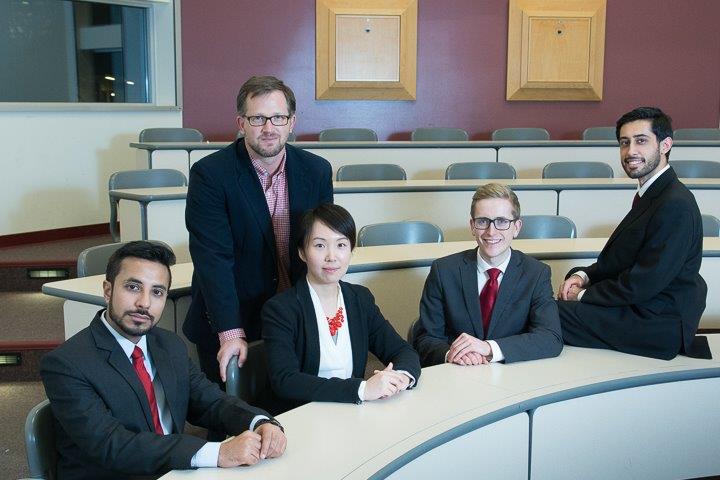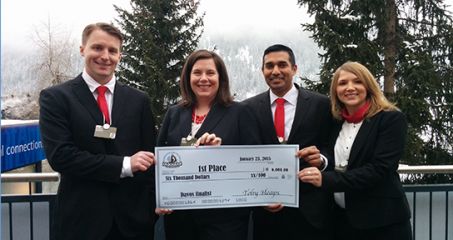A Davos dynasty
Peter B. Gustavson School of Business
- Krista Boehnert

MBA students repeat first-place performance in international sustainability business competition
Competing in the Corporate Knights’ “Business for a Better World Case Competition” is not for the faint of heart. Teams are pitted against fellow MBA students from universities across the globe for the opportunity to present their green business plan to a panel of elite judges in Davos, Switzerland during the World Economic Forum.
No pressure, right?
Having sustainability as one of the central pillars at the Gustavson School of Business certainly gives UVic MBA students an advantage—but the competition is still fierce.
The 2016 team representing UVic’s Sardul S. Gill Graduate School had an added dollop of stress to contend with that other entrants did not: they were defending the university’s 2015 championship title—and they were determined not to disappoint.
In 2015, the UVic team had taken the top prize for presenting environmental recommendations and social and governance initiatives to help improve pharmaceutical heavy-hitter Novartis’s standing on Corporate Knights’ ranking. Mock presentations and Q&A sessions with business faculty and industry executives helped prepare the 2015 team, helping them refine their presentation for the Davos audience.
In the 2016 competition, teams from 14 countries provided recommendations to decarbonize the holdings of the Norway Government Pension Fund Global. Worth approx. $940 billion (USD), the fund has been built from the surpluses of Norway’s petroleum income. As part of the competition, students were given access to a tool that allowed them to assess the carbon profile of the fund’s holdings.
After two elimination rounds, judges named three finalists—and the UVic team finished “in good company” alongside student teams from Duke and York University.
With that win, the UVic team was headed to the World Economic Forum. The race was on to score a repeat victory, and it was all hands on deck.
Faculty, staff and business community advisers held a special dress rehearsal for team members Laurent Sevigny, Bhupinder Dulku, Dorothy Pan, and Mukesh Dhatwalia. Dr. Matt Murphy, the team’s faculty adviser, knew the importance of providing the team with as real a presentation simulation as possible so that when they presented in Davos, the team would have a similar experience to draw from—a technique that proved successful for the 2015 championship team. Jesal Shah and Andrew Spence, members of last year’s team, joined this practice judging panel. The simulation mimicked what the students would experience in Davos: 10 minutes to present their case to the panel, followed by a short Q&A. After the dress rehearsal, the team got feedback on how to improve their performance.
Once in Davos, Sevigny, Dulku, Pan and Dhatwalia presented to the panel of five judges their plan for the trillion dollar Norwegian Oil Fund to reduce its equity portfolio carbon intensity and reduce exposure to fossil fuel reserves, while shifting $18.8 billion of the fund’s holdings from carbon-intensive high-risk stocks to clean stocks with more attractive financial prospects. The team’s re-investment strategy generated total returns of 219 per cent over a 10 year back-test—besting comparable benchmarks by a wide margin.
So what about that repeat victory?
Sevigny, Dulku, Pan, and Dhatwalia have their bragging rights. UVic’s Gill Graduate School reclaimed first prize—with Duke second and York third.
All three finalist teams will have their presentations and background materials shared with the Norwegian Ministry of Finance and Norges Bank Investment Management, which manages Norway’s oil fund.
Photos
In this story
Keywords: davos, student life, international, sustainability



